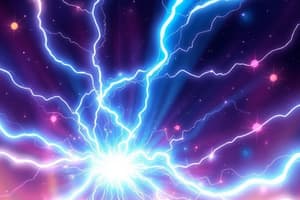Podcast
Questions and Answers
What is an electric charge?
What is an electric charge?
- An abstract concept with no real-world applications
- The physical quantity that determines the behavior of objects under electromagnetic forces (correct)
- A fundamental concept in physics related to the study of sound waves
- A physical quantity that determines the behavior of objects under gravitational forces
How are positive and negative charges denoted?
How are positive and negative charges denoted?
- - and +q
- -q and +p
- +q and -p
- + and - (correct)
What property of electric charges states that total electric charge in a closed system remains constant?
What property of electric charges states that total electric charge in a closed system remains constant?
- Dispersity
- Depletion
- Conservation (correct)
- Mutability
How are electric fields described?
How are electric fields described?
What is the strength of the electric field defined as?
What is the strength of the electric field defined as?
Which statement about electric field lines is correct?
Which statement about electric field lines is correct?
What does Coulomb's Law state?
What does Coulomb's Law state?
Which application does NOT involve the role of electric charge and field?
Which application does NOT involve the role of electric charge and field?
In which application do charged particles interact with magnetic fields?
In which application do charged particles interact with magnetic fields?
What is the electrostatic constant in Coulomb's Law approximately equal to?
What is the electrostatic constant in Coulomb's Law approximately equal to?
Flashcards are hidden until you start studying
Study Notes
Electric Charge and Field: A Comprehensive Overview
Electric charge and field are fundamental concepts in the realm of physics, particularly in the study of electromagnetism. They underpin the behavior of charged objects and the forces that arise due to their interactions. In this article, we'll delve into the world of electric charge and field, exploring their definitions, properties, and applications.
Electric Charge
An electric charge is the physical quantity that determines the behavior of objects under the influence of electromagnetic forces. Charges can either be positive or negative, with the former being denoted as "+q" and the latter as "-q". Charges can be accumulated on objects by transferring electrons from one object to another, or by moving charged particles like ions.
Electric charges have the following properties:
- Conservation: Total electric charge in a closed system remains constant.
- Additivity: Charge can be divided into equal parts and distributed among objects.
- Linearity: Charges combine linearly when added together.
Electric Field
An electric field (E-field) is a region in space around a charged object where the force exerted on a charged particle is non-zero. The electric field is described by its vector field, with the direction of the field lines pointing from positive charges to negative charges. The strength of the electric field is given by the magnitude of the electric field vector, which is defined as the force per unit charge acting upon a test charge.
Electric field lines have the following properties:
- Radiating from a positive charge: Field lines emerge from a positive charge and flow towards negative charges.
- Converging at a negative charge: Field lines flow towards a negative charge and terminate at it.
- No field lines between charged objects: There are no field lines between two charged objects, indicating that the force between them drops off with increasing distance.
Coulomb's Law
Coulomb's Law is a fundamental equation that describes the electrostatic force between two charged particles. It states that the force between two point charges is proportional to the product of their charges and inversely proportional to the square of the distance between them. Mathematically, this can be expressed as:
$$ \mathbf{F} = k \frac{\mathbf{q}_1 \cdot \mathbf{q}2}{\mathbf{r}{12}^2} $$
Where:
- F is the force between the two charges.
- k is the electrostatic constant (approximately $8.99 \times 10^{9} \mathrm{~N} \cdot \mathrm{m}^2 / \mathrm{C}^2$).
- q1 and q2 are the charges of the two objects.
- r12 is the distance between the centers of the two objects.
Applications of Electric Charge and Field
Electric charge and field play pivotal roles in numerous applications, including:
- Electrical circuits: Charges and fields are central to the behavior of electrical circuits, where voltage differences create electric fields, and current flows along the path of least resistance.
- Electrostatics: The study of electric charges at rest, where static charges accumulate on objects and produce electric fields.
- Electromagnetism: The study of electric charges in motion, where charged particles interact with magnetic fields and produce electromagnetic forces.
- Electric power generation: Charges and fields are key factors in the generation of electricity, where electric generators convert mechanical energy into electrical energy by manipulating charges and fields.
In conclusion, electric charge and field are essential concepts that underpin our understanding of electromagnetism. They provide the foundations for the behavior of charged objects and the forces that arise due to their interactions. Understanding these concepts is crucial for the development of numerous applications, including electrical circuits, electrostatics, electromagnetism, and electric power generation.
Studying That Suits You
Use AI to generate personalized quizzes and flashcards to suit your learning preferences.




